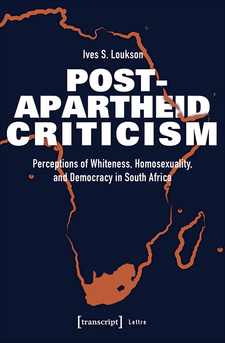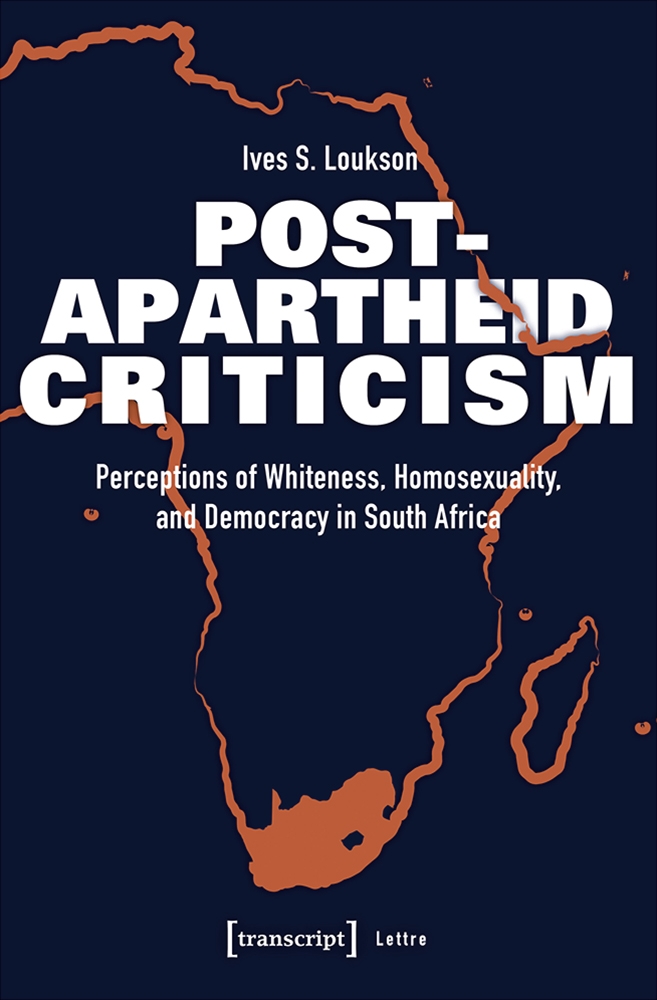Post-Apartheid Criticism. Perceptions of Whiteness, Homosexuality, and Democracy in South Africa, by Ives S. Loukson

This is an excerpt from Post-Apartheid Criticism. Perceptions of Whiteness, Homosexuality, and Democracy in South Africa, by Ives S. Loukson. transcript Verlag. Bielefeld, Germany 2020. ISBN 9783837649192 / ISBN 978-3-8376-4919-2
In working at the junction between the reflected South Africa and an alternative South African society idealized in the post-apartheid narrative, Post-Apartheid Criticism. Perceptions of Whiteness, Homosexuality, and Democracy in South Africa, by Ives S. Loukson, articulates a conception of African literature in the face of performances, challenges and merits of literature in general.
South Africa is a cultural exemption in Africa. More obviously than any other African country does, South Africa involves conflicting ideologies, cultural and racial diversity on a national scale. Culturally, South Africa is a microcosm of, if not the whole world, the whole Africa. Whites, blacks, children born of black and white parentage, Indians, Asians, Muslims, Christians, former slaves and former masters partake in the construction of South Africa engaging the country in a challenging quest for a truly multicultural, democratic, and inclusive society in its post-segregation era. In their diversity, South Africans are engaged in a challenging quest for an open society that welcomes "all into the house of Africa, (...) breaking down (...) social walls and (...) expurgati [ng]1 (...) the pathologies of Apartheid" (Giliomee, 1996, p. 95). Post-Apartheid Criticism. Perceptions of Whiteness, Homosexuality, and Democracy in South Africa seeks to contribute to the debate about how an inclusive, multicultural, and fully democratic South Africa can be sustainably achieved in its actual constellation. Coined that way, my topic, prima facie, poses the problem of why it works to relate whiteness, homosexuality along with democracy in post-apartheid South Africa? As far as I remember, it was almost at the end of my research that this title imposed itself as topic to my work. Before then, I thought it my obligation to fill what I considered a racial gap left void in my previous endeavors with South African post-apartheid literature. By then, my main interest in literature had always been the complex notion of aesthetics that I valued due to its potential to keep human intelligence alert and alive. Many literary studies I read made me uncomfortable with how they used literature to fulfill either anthropological, societal, ethnographic, nationalist or nationalistic aims. Only few, particularly in African literary studies, addressed Ii-terature as a discourse perse. My dissatisfaction remained firm until I came across The Opacity of Narrative by Peter Lamarque in which he makes the point stronger by writing that "literary critics on the whole show a marked reluctance to acknowledge the relevance of aesthetics to literature" (Lamarque, 2014, p. 169). It is then that I began to think about deaIing with compIexities, which wouId replicate that of aesthetics, highlighted by Strawson as follows: "there can be no general descriptive criteria for aesthetic assessment" (Strawson, 1974, p. 186). I began to look for the more elaborate aesthetical features in my corpus that could drain my concerns and discontents. Whiteness, homosexuality, democracy, and Relation finally emerged in the final analysis as the satisfactory answer to my preoccupations. Literature being not a mere mirror of society, but also a shapeshifter thereof, connecting these concepts gives me the opportunity to experience this ontological reciprocity about literature in post-apartheid narrative. My study dealing with literature from the African continent, it would not appear redundant to bear in mind that narratives by Camara Laye and Mongo Beti have helped pose the question of African literature's axiology. Far from being an art that portrays an exotic Africa as Beti criticized Laye's Black Boy2 of doing, or an exotic site of difference as George Yancy puts it in relation to black American literature (Yancy, 2008, p. 43), African literature aims at enabling deeper understanding of African problems. It simultaneously serves as miraculous weapons3 aiming to challenge African impasses. [...]
This is an excerpt from Post-Apartheid Criticism. Perceptions of Whiteness, Homosexuality, and Democracy in South Africa, by Ives S. Loukson.
Title: Post-Apartheid Criticism
Subtitle: Perceptions of Whiteness, Homosexuality, and Democracy in South Africa
Author: Ives S. Loukson
Publisher: transcript Verlag
Bielefeld, Germany 2020
ISBN 9783837649192 / ISBN 978-3-8376-4919-2
Softcover, 16 x 24 cm, 282 pages
Loukson, Ives S. im Namibiana-Buchangebot
Post-Apartheid Criticism. Perceptions of Whiteness, Homosexuality, and Democracy in South Africa
Post-Apartheid Criticism. Perceptions of Whiteness, Homosexuality, and Democracy in South Africa seeks to examine the contribution of post-apartheid narrative.

